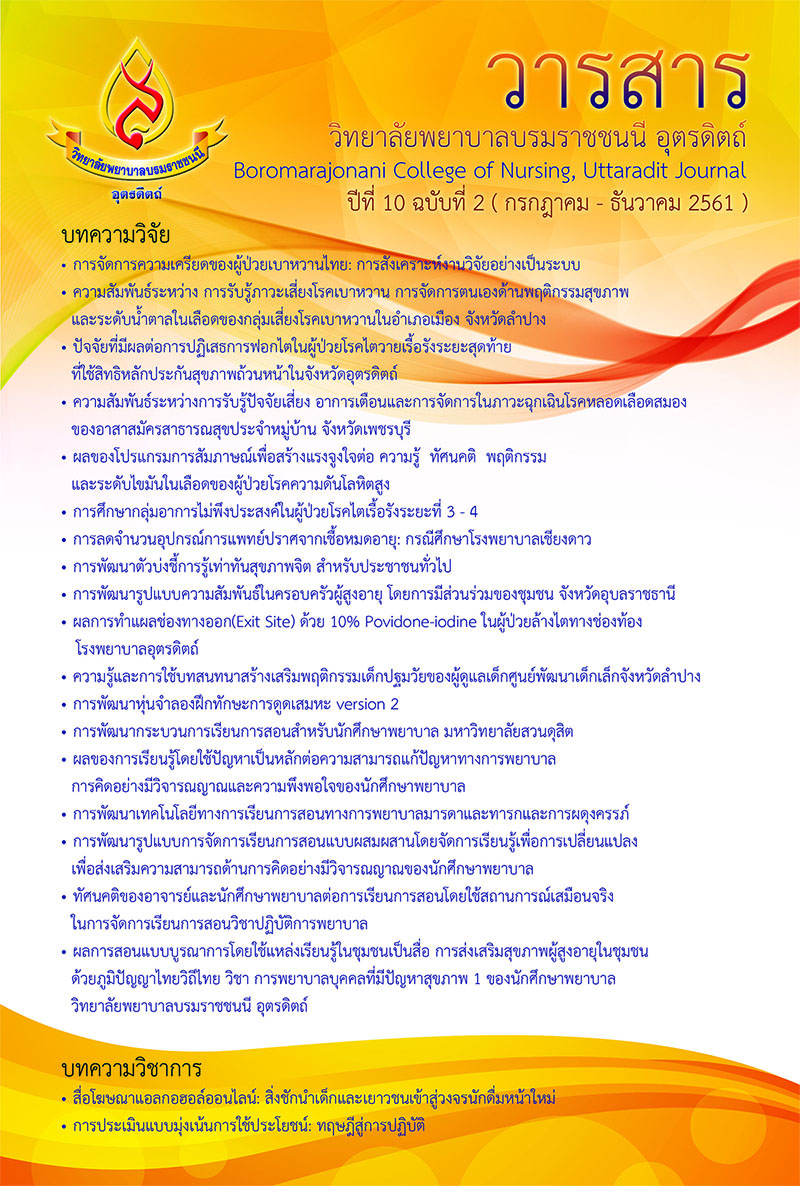ผลของการเรียนรู้โดยใช้ปัญหาเป็นหลักต่อความสามารถแก้ปัญหาทางการพยาบาลการคิดอย่างมีวิจารณญาณและความพึงพอใจของนักศึกษาพยาบาล
Main Article Content
บทคัดย่อ
การเรียนโดยใช้ปัญหาเป็นหลักเป็นการเรียนรู้ด้วยตนเอง จากการเรียนกลุ่มย่อยเพื่อพัฒนาความรู้ที่นำมาแก้ไขปัญหา การศึกษาแบบกึ่งทดลองครั้งนี้มีวัตถุประสงค์เพื่อ 1) ศึกษาความสามารถแก้ปัญหาทางการพยาบาลภายหลังการเรียนรู้โดยใช้ปัญหาเป็นหลัก 2) เปรียบเทียบการคิดอย่างมีวิจารณญาณก่อนเรียนและหลังเรียนโดยใช้ปัญหาเป็นหลัก และ 3) ศึกษาความคิดเห็นและความพึงพอใจของนักศึกษาที่เรียนโดยใช้ปัญหาเป็นหลัก กลุ่มตัวอย่างเป็นนักศึกษาพยาบาลศาสตร์ชั้นปีที่ 2 จำนวน 114 คน วิทยาลัยพยาบาลบรมราชชนนี อุตรดิตถ์ ที่เรียนรายวิชาการการพยาบาลบุคคลที่มีปัญหาสุขภาพ 1 เครื่องมือที่ใช้ในการวิจัย ประกอบด้วย 1) แบบทดสอบความสามารถแก้ปัญหาทางการพยาบาล 2) แบบประเมินการคิดอย่างมีวิจารณญาณ และ 3) แบบสอบถามความคิดเห็นและประเมินความพึงพอใจในการเรียนโดยใช้ปัญหาเป็นหลัก วิเคราะห์ข้อมูลโดยใช้ความถี่ ร้อยละ และสถิติทดสอบที (paired t-test) ผลการศึกษาพบว่า
1.ความสามารถแก้ปัญหาทางการพยาบาลบุคคลที่มีปัญหาระบบขับถ่ายปัสสาวะอยู่ในระดับปาน-กลางร้อยละ 48.24 ระดับสูงร้อยละ 3.51 การเปรียบเทียบความสามารถแก้ปัญหาทางการพยาบาลในการเรียนรู้โดยใช้ปัญหาเป็นหลัก มีความสามารถฯมากกว่าการเรียนแบบบรรยายอย่างมีนัยสำคัญทางสถิติที่ระดับ .01 (p<.01)
2. ภายหลังการเรียนโดยใช้ปัญหาเป็นหลักนักศึกษามีการคิดอย่างมีวิจารณญาณสูงกว่าก่อนเรียนอย่างมีนัยสำคัญทางสถิติที่ระดับ.05 (p<.05)
3. นักศึกษามีความพึงพอใจในการเรียนโดยใช้ปัญหาเป็นหลัก เนื่องจากช่วยส่งเสริมความสามารถแก้ปัญหา ทำงานเป็นทีม แลกเปลี่ยนความรู้ ได้ความรู้ที่ลึกซึ้งและเกิดความเครียด
ผลการศึกษาแสดงให้เห็นว่าการเรียนโดยใช้ปัญหาเป็นหลักเป็นทางเลือกหนึ่งในการพัฒนานักศึกษาพยาบาลให้มีสมรรถนะในศตวรรษที่ 21
Article Details
บทความหรือข้อคิดเห็นใดใดที่ปรากฏในวารสารวิจัยการพยาบาลและวิทยาศาสตร์สุขภาพ เป็นวรรณกรรมของผู้เขียน ซึ่งบรรณาธิการหรือสมาคมศิษย์เก่า ไม่จำเป็นต้องเห็นด้วย และบทความที่ได้รับการตีพิมพ์เผยแพร่ถือเป็นลิขสิทธิ์ของวารสารวิจัยการพยาบาลและวิทยาศาสตร์สุขภาพ
เอกสารอ้างอิง
2. Annerstedt C, Garza D, DeVoss C, Lindh, J., & Rydmark, M. (2010). Researchable through problem-based learning. Journal of the Scholarship of Teaching and Learning, 10(2), 107-127.
3. Arpanantikul, M.& Luecha, Y. (2010). Problem-based learning: Undergraduate Thai nursing students’ perceptions. Pacific Rim International Journal of Nursing Research, 14(3), 262-276.
4. Asyari, M., Al Muhdhar, MHI., Susilo, H.,& Ibrohim. (2016). Improving critical thinking skills through the integration of problem based learning and group investigation. International Journal for Lesson and Learning Studies, 5(1), 36-44.
5. Batdı, V. (2014). The effects of a problem-based learning approach on students’ attitude levels: A meta-analysis. Educational Research and Reviews, 9(9), 272-276.
6. Bellanca, J. & Brandt, R. (2010). 21st Century Skills: Rethinking how students learn. Solution Tree Press, USA.
7. Carbogim, FC., Oliveira, LB., Mendonça, ET., Marques, DA., Friedrich, DBC., & Püschel, VAA.(2017). Teaching critical thinking skills through problem based learning. Texto Contexto Enferm. 26(4), 1-10, e1180017.
8. Choi, E., Lindquist, R., & Song, Y. (2014). Effects of problem-based learning vs.traditional lecture on Korean nursing students’ critical thinking, problem-solving, and self-directed learning. Nurse Education Today, 34(1), 52-56.
9. Facione, P. (2015 update). Critical thinking: What it is and why it counts. Insight Assessment, Retrieved from https://www.scribd.com/document/357190993/facione-2015-critical- thinking-what-it-is-and-why-it-counts-pdf
Framework for 21st century skill. Retrieved from https://www.p21.org/our-work/p21-framework
10. Gulvao,TF., Silva,MT., Neiva,CS., Ribeiro,LM.,& Pereira, MP. (2014). Problem-based learning inPharmaceutical education: A systematic review and meta-analysis. The Scientific World Journal, Retrieved from https://dx.doi.org/10.1155/2014/578382.
11. Hamdan,AR., Kwan,CL., Khan,A., Ghafar,MNA., & Sihes, AJ. (2014). Implementation of problem based learning among nursing students. International Education Studies, 7(7),136-142.
12. Louise, N., Kristine, P., & Mary,G.( 2010). Problem-based learning in nursing education: A process for scenario development. Nurse Educator. 35(2), 69-73.
13. Mapiw, P., Lorthamma, P., Khunkaew, S., Promma, A., & Ngamvaseenont, S. (2013). A comparison of critical thinking between the first and the fourth year nursing students at Boromarajonnani college of nursing, Uttaradit. Boromarajonnani college of nursing, Uttaradit Journal, 5(1), 20-30. (in Thai)
14. Ministry of Education. (2018). Notification of Ministry of Education on the Standards of Bachelor Degree in Nursing Science Program, January 2018. (in Thai)
15. Oldenburg, NL.,& Hung,W. (2010). Problem solving strategies used by RN-to-BSN students in online problem-based learning course. Journal of Nursing Education, 49(4), 219-222.
16. Panomrit, S., Turner,K., Chareonsuk,S., Wisawatapnimit,P., Kaewjiboon, J. & Ananchaipatana, N. (2011). Development of teaching-learning models based on problem-based larning and self-regulation approaches to foster critical thinking and self efficacy competencies of nursing students. Journal of Nursing and Education, 4(2),108-123.
(in Thai)
17. Tantalanukul, S. & Wongsawat,P. (2017). Stress and stress management in nursing students. Boromarajonnani college of nursing, Uttaradit Journal, 9(1), 81-90. (in Thai)
18. Thabet, M., EL-Sayed Taha,E., Abood, SA., & Morsy, SR.(2017).The effect of problem-based learning on nursing students’ decision making skills and styles. Journal of Nursing Education and Practice, 7(6), 108-116.
19. Tiwari, A., Lai, P., So,M.,& Yuen,K. (2006). A comparison of the effects of problem-based learning and lecturing on the development of students' critical thinking. Medical Education, 40(6), 547–554.
20. Trilling,B. & Fadel, C. (2009). 21st Century skills: learning for life in our times. San Francisco: Jphn Wiley & Sons.
21. Vongtathum, P. (2015). Creative problem solving thinking skills for 21st century of learning. Journal of Education KHON KAEN University, 38(2), 111-121. (in Thai)
22. Walsh. (2005). The Tutor in problem based learning: A Novice's Guide. Hamilton: McMaster University, Canada.


